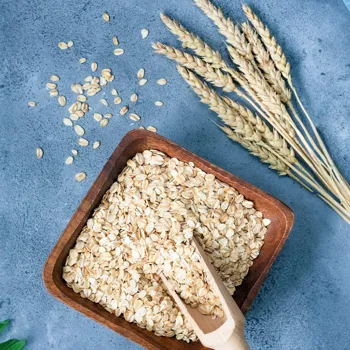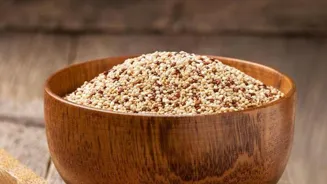Unveiling the Magic of Whole Grains: A Deep Dive into Their Health Benefits. Read on to discover why they are essential!
In the colourful tapestry of Indian cuisine, where spices dance and flavours explode,
it's easy to overlook the humble heroes that form the foundation of our daily meals: whole grains.
Beyond being mere sources of energy, these nutritional powerhouses offer a wealth of health benefits that can significantly impact our well-being.
From boosting digestion to protecting against chronic diseases, incorporating whole grains into your diet is an investment in a healthier and happier you. So, let's delve into the world of whole grains and discover why they deserve a prominent place on your plate.
Whole grains contain bran, germ, endosperm for health; choose wisely
Before we sing their praises, it's crucial to understand what exactly constitutes a whole grain. Unlike refined grains, which undergo processing that strips away valuable nutrients, whole grains retain all three parts of the kernel: the bran, the germ, and the endosperm.
The bran, the outer layer, is packed with fibre, vitamins, and minerals. The germ, the nutrient-rich core, contains vitamins, minerals, protein, and healthy fats. And the endosperm, the largest part, provides carbohydrates for energy.
When a grain is refined, the bran and germ are removed, leaving behind primarily the starchy endosperm. This process not only diminishes the nutritional value but also alters the way the body processes the grain.
Choosing whole grains over refined grains is a simple yet powerful way to enhance your diet and reap the numerous health benefits they offer. Think of it as choosing the complete package – the whole grain – versus a stripped-down version that lacks essential goodness.
Whole grains are essential for health, providing fiber, nutrients, and blood sugar control
Whole grains are veritable treasure troves of essential nutrients. They are excellent sources of dietary fibre, both soluble and insoluble, which plays a vital role in maintaining digestive health. Fibre adds bulk to the stool, preventing constipation and promoting regularity.
It also helps regulate blood sugar levels by slowing down the absorption of glucose, making it particularly beneficial for individuals with diabetes or at risk of developing the condition.
Furthermore, the fibre in whole grains can contribute to weight management by promoting feelings of fullness, which can help reduce overall calorie intake. Beyond fibre, whole grains are also rich in vitamins and minerals, including B vitamins, magnesium, iron, and zinc.
These nutrients are essential for various bodily functions, such as energy production, nerve function, immune system support, and red blood cell formation. By incorporating whole grains into your diet, you provide your body with the building blocks it needs to thrive.
Regular whole grain consumption reduces chronic disease risk
The benefits of whole grains extend far beyond basic nutrition. Numerous studies have shown that regular consumption of whole grains is associated with a reduced risk of various chronic diseases.
For instance, the fibre, antioxidants, and other beneficial compounds in whole grains can help lower cholesterol levels, reducing the risk of heart disease. They can also help regulate blood sugar levels and improve insulin sensitivity, which is crucial for preventing type 2 diabetes.
In addition, some studies suggest that whole grains may offer protection against certain types of cancer, such as colon cancer. The protective effects of whole grains are likely due to the synergistic action of their various components, working together to promote overall health and well-being.
By making whole grains a regular part of your diet, you are investing in your long-term health and reducing your risk of developing these debilitating conditions.
Incorporating Whole Grains into Your Indian Diet
Delicious and Easy Ways
Whole grains enrich Indian cuisine; swap refined with nutritious options
The beauty of whole grains is that they can be seamlessly integrated into the diverse and flavourful landscape of Indian cuisine. From the humble roti to the comforting khichdi, there are countless ways to enjoy the goodness of whole grains.
Instead of refined white flour, opt for whole wheat flour to make chapatis, parathas, and other Indian breads. Brown rice is a nutritious alternative to white rice and can be used in biryanis, pulaos, and even simple rice dishes.
Dalia, or broken wheat, is a versatile grain that can be used to make upma, porridge, or even added to soups and salads. Oats are another excellent choice for breakfast, whether in the form of porridge, upma, or even added to smoothies.
Experiment with different whole grains like jowar (sorghum), bajra (pearl millet), and ragi (finger millet) to add variety to your diet and discover new flavours. Remember, small changes can make a big difference.
By gradually replacing refined grains with whole grains, you can easily reap the numerous health benefits they offer.
Navigate grocery store for whole grain products: choose wisely for health benefits
Navigating the grocery store aisles can be a daunting task, especially when trying to identify whole grain products. Food labels can be confusing, but understanding a few key terms can help you make informed choices.

Look for products that list "whole wheat," "whole grain," "brown rice," "oats," or other whole grain ingredients as the first ingredient on the label. Be wary of products that are labelled "multi-grain" or "wheat flour," as these may not necessarily be whole grain.
The term "enriched" simply means that certain nutrients have been added back to the product after processing, but it does not mean that the product is a whole grain. Pay attention to the fibre content per serving, as higher fibre content indicates a greater proportion of whole grains.
When in doubt, opt for minimally processed whole grain products, as they tend to be more nutritious. By becoming a savvy label reader, you can ensure that you are choosing whole grain products that truly deliver the health benefits you are seeking.
Incorporate whole grains for long-term health benefits
Ultimately, incorporating whole grains into your diet is about making conscious choices that support your overall health and well-being. It's not about drastic changes or restrictive diets, but rather about making small, sustainable adjustments that can have a significant impact over time.
Start by swapping your usual white bread for whole wheat bread. Try replacing white rice with brown rice in some of your meals. Experiment with different whole grain recipes to find ones that you enjoy. Gradually increase your intake of whole grains until they become a staple in your diet.
Remember, consistency is key. By making whole grains a regular part of your diet, you are investing in your long-term health and reaping the numerous benefits they offer. So, embrace the whole grain way of life and unlock the power of these nutritional treasures for a healthier and happier you.





















